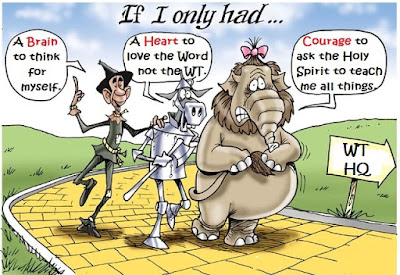In Part 2 I quote some more gems from the WT, extolling the virture of studying WT publications and putting the Bible on their 'do not read list--use as a reference only.' My comments are in RED.
“From time to time, there have arisen from among the ranks of
Jehovah's people those, who, like the original Satan, have adopted an
independent, faultfinding attitude...They say that it is sufficient to read the
Bible exclusively, either alone or in small groups at home. But, strangely,
through such ‘Bible reading,' they have reverted right back to the apostate
doctrines that commentaries by Christendom's clergy were teaching 100 years
ago..." “The Watchtower,” August 15, 1981.
The above WT quote is saying if you read the Bible, either alone or in a
small group at home, then you are
like Satan. Is this freedom of thought? Is this how Christ works in the
church?
Also, what are the apostate doctrines spoken of in the above quote?
Would that be the Trinity, the deity of Christ, the physical resurrection of
Christ, all things the WT organization denies. So, if you read the Bible by
itself, reading it for what it says, without the WT guiding you, you will adopt
these doctrines!
“It should be expected that the Lord would have a means of
communicating to his people on the earth, and he has clearly shown that the
magazine called The Watchtower is used for that purpose.“ 1939 Yearbook,”
pg. 85
“Jehovah is using only one organization today to accomplish his
will. To receive everlasting life in the earthly Paradise we must
identify that organization and serve God as part of it.” WT, 2/15/1983, pg. 12
“The arrogance of your heart has deceived you,” Obadiah 1:3
“We should meekly go along with the Lord's theocratic organization
and wait for further clarification, rather than balk at the first mention of a
thought unpalatable to us and proceed to quibble and mouth our criticisms and
opinions as though they were worth more than the slave's provision of spiritual
food. Theocratic ones will appreciate the Lord's visible organization and not
be so foolish as to put against Jehovah's channel their own human reasoning and
sentiment and personal feelings." WT, February 1, 1952, pgs. 79-80.
“Avoid independent thinking . . . questioning the counsel that is
provided by God’s visible organization (WTBTS).” WT, Jan 15, 1983, p. 22.
The WT is not only into controlling your Bible study but into what
you think about the WT ‘counsel.’
Here is the fundamental problem with studying with JW’s.
When a Witness knocks on a person’s door and engages the homeowner
in a conversation, it is with the hope that a ‘Bible study’ will be requested.
If the homeowner takes the
bait and requests a ‘Bible
study’ then the switch will take place. On the day the study
is to begin the Witness comes with a WT book to be studied (as I said) from
cover to cover. Your Bible will be used as a reference
book—to look up a verse now and then or maybe just half a verse. As you
progress through the WT book page by page, the WT will tell you what the Bible
teaches and then will direct you to read a verse that ‘proves’ what they have
just told you. At the bottom of each page are some questions that you answer by
re-reading the paragraphs. After you have finished with the WT book, you are
very familiar with WT doctrine but not Bible
doctrine.
The Books of the Bible, of both the Old and New Testament, were
originally written as continuous text, without chapters and verses. The early
Christians eventually assigned the text to chapters and verses, to make
referencing easier. The Jews found this innovation useful and followed suit in
the Hebrew Bible. To properly understand the Bible one needs to read it as it
was written—as continuous text—not broken up into verses and parts of verses.
The WT kind of study prevents one from reading the verse in its context. Why is
context so important?
First, because a text (verse) taken out of context is a pretext to
teach anything—no matter how un-Biblical. I remember this absurd example, but
it shows the importance of reading and knowing the context of any Bible verse.
If you read part of Matthew 27:5, Luke 10:37 and John 13:27 you get, “Judas
hung himself--go and do likewise--whatever you do, do it quickly.” Is that what
those verses teach? How would you prove otherwise? Simple. Read each book in
which each verse is found—know the context.
Second, the context of a verse determines its meaning. As an
example, what does the word “trunk” mean?—the rear of a car, the long nose of
an elephant, a big container for old clothes or part of a tree. The correct
meaning of “trunk” will only be known when you know the words around it, for
the words around “trunk” give “trunk” its correct meaning. A verse in the Bible
is the same. If you pull a single verse out of its context, you will likely not
understand its correct meaning. A verse is given meaning only by the verses
around it.
I once heard that when a business is selecting a store site there
are three important considerations: location, location and location.


No comments:
Post a Comment